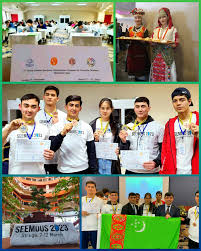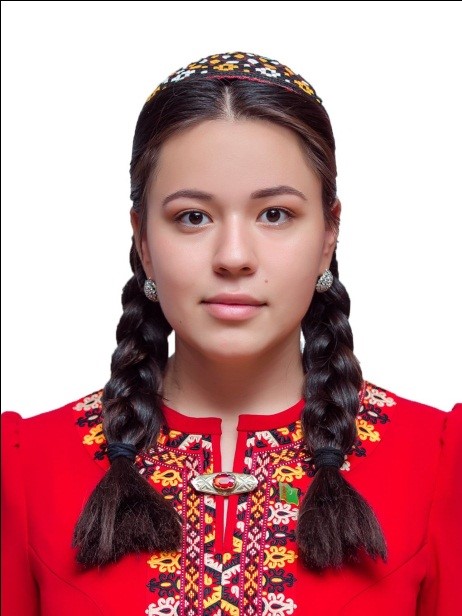Aylar ORAZBAYEVA
Turkmenistan is known today as a state relying on modern achievements of scientific and technological progress, new technologies and innovations, science, education and culture. In that context, the Government attaches great importance to the formation of young generation, with ample opportunities to get modern education and engage in scientific and creative activities. Turkmenistan is creating all opportunities for the younger generation to receive a high-quality education, become true professionals in their chosen specialty, and be brought up in a high spirit of patriotism and humanism.
President of Turkmenistan Serdar Berdimuhamedov stated in his speech at the National Assembly (Dovlet Maslahaty) meeting (Ashgabat, 23 September 2022): “Turkmenistan entered a new era of independent development that spans the following decades. We are solving long-term, modern and ambitious tasks aimed at increasing the economic potential of our country, employment and living standards of compatriots, and the development of human capital”.
One of the area where effectively implementing international cooperation on the humanitarian law is the interaction with the UN structures. We can say that now a large number of international legal instruments are being created within the UN system, which are based on an extensive system of international legal instruments aimed at protecting humanitarian principles and ensuring human security. On their basis, effective principles of international politics and multilateral diplomacy have been developed and are systematically being implemented.
It should be noted that upon obtaining independence and the status of permanent neutrality, Turkmenistan adopted the Declaration on international obligations in the field of human rights and freedoms and the Declaration on the foreign policy course of Turkmenistan in the twenty-first century based on permanent neutrality and the principles of peaceableness, good-neighbourliness and democracy, and thereby set its independent course towards resolving humanitarian issues.
The reforms, introduced under the direct leadership of the head of State, have promoted progressive renewal of the entire social and political system and recognition of the authority of neutral Turkmenistan by the entire world community. The constructive foreign policy of Turkmenistan is a key and reliable factor in ensuring successful implementation of the international obligations it has assumed in the field of human rights. Turkmenistan recognizes the key importance of the generally accepted norms of international law, and has ratified a large number of major fundamental conventions and multilateral agreements on human rights. They include: – the International Covenant on Economic, Social and Cultural Rights; – the International Covenant on Civil and Political Rights; – the Convention against Torture and Other Forms of Cruel, Inhuman or Degrading Treatment or Punishment; – the Convention on the Elimination of All Forms of Discrimination against Women and the Optional Protocol to that Convention; – the Convention on the Elimination of All Forms of Racial Discrimination; – the Convention on the Rights of the Child; – the Convention on the Rights of Persons with Disabilities; – the Convention relating to the Status of Refugees; and others. Besides those international human rights documents, Turkmenistan acceded on 10 April 1992 to the basic four Geneva Conventions of 1949 for the protection of war victims and the two Additional Protocols to the Conventions of 1977.
Over the years since independence Turkmenistan has joined to a number of other international instruments in the field of humanitarian law: – the Convention on Prohibitions or Restrictions on the Use of Certain Conventional Weapons which May Be Deemed to Be Excessively Injurious or to Have Indiscriminate Effects and two protocols to the Convention: Protocol I on Non-Detectable Fragments and Protocol II on Prohibitions or Restrictions on the Use of Mines, Booby-Traps and Other Devices; – the Convention on the Prohibition of the Development, Production, Stockpiling and Use of Chemical Weapons and on Their Destruction of 1993; – the Convention on the Prohibition of the Use, Stockpiling, Production and Transfer of Anti-personnel Mines and on Their Destruction of 1997; – the Optional Protocol to the Convention on the Rights of the Child on the involvement of children in armed conflict; and others. Turkmenistan, as a State that constantly supports all initiatives that promote a peaceful world order, condemns wars, international terrorism and the arms race.
As a one of the efficient step of humanitarian diplomacy, on April 16, 2021 Turkmenistan signed a Decree approving the National Human Rights Action Plan of Turkmenistan for 2021-2025 (NHRAP for 2021-2025). The adoption of the given NHRAP 2021-2025 is aimed at strengthening the national system of provision and protection of human rights and liberties in Turkmenistan, implementation of the international obligations of the country in the given area, and the expansion of cooperation with the international organizations in the humanitarian sphere. The NHRAP for 2021-2025 implemening by state and local authorities with involvement of civil society organizations, UN Agencies, and other international organizations.
One of the important events for the development of humanitarian diplomacy was the first-ever World Humanitarian Summit held on May 23 and 24, 2016 and gathered 9 thousand participants from 173 UN member states, including 55 heads of state and government, hundreds of private sector representatives and thousands of employees of civil society organizations society. The summit’s goal was to fundamentally reform the humanitarian aid industry to react more effectively to today’s many crises. World leaders were expected to come to the summit and announce the actions they will take to end the suffering of millions of women, men and children affected by armed conflicts and disasters. The content of the discussions was determined by the report of UN Secretary General Ban Ki-moon “One Humanity: A Shared Responsibility” and its annex “An Agenda for humanity”.
Turkmenistan takes an active part in international humanitarian forums. One of the closest examples on March 16, 2023, the National Leader of the Turkmen people, Chairman of the Halk Maslahaty of Turkmenistan Gurbanguly Berdimuhamedov paid a working visit to the Republic of Türkiye. Upon the invitation of President Recep Tayyip Erdogan, he took part in an extraordinary meeting of the Council of Heads of State of the Organization of Turkic States (OTS). The agenda of this Summit includes issues related to the development of multilateral cooperation in the field of emergency management and humanitarian assistance, coordination of common efforts in preventing and overcoming the consequences of natural disasters, and developing measures to respond to new challenges.
Speaking at the meeting, the Chairman of the Halk Maslahaty of Turkmenistan Gurbanguly Berdimuhamedov, noting that the theme of the Summit “Natural Disasters: Emergency Management and Humanitarian Aid” is of great importance, stressed the need to provide each other with friendly, fraternal assistance. The Chairman of the Halk Maslahaty, addressing the participants of the Summit, stated that, due to the fact that the member countries of the Organization of Turkic States are located in seismic zones, it is very important to coordinate actions to ensure seismic safety. For these purposes, it was proposed within the framework of the OTS to establish cooperation on basic issues of seismology, modern geodynamics and geophysics.
In that context one of the important areas of humanitarian diplomacy is cooperation in the field of higher education and scientific researches. Turkmenistan is actively cooperating with higher education institutions of other countries in higher education and other educational institutions of the country by expanding international cooperation in the field of development of the education system and training of highly qualified specialists, active participation in the world educational space.
In particular, the International University for the Humanities and Development cooperates with such world-famous educational institutions as University of Applied Studies of Austria (Austria); Ada University (Azerbaijan); Hanyang University and Sungkyunkwan University (Korea); Management and Science University (Malaysia); Tokyo University of Foreign Studies (Japan); Universitatea Alba Iulia, University of Pitesti and “Vasile Goldis” Western University of Arad (Romania); Institute of Peace and Diplomatic Studies (Pakistan); Wright State University (USA) and other.
A number of international projects are being implemented at the university, such as HiEdTec and GEOCLIC. Modernization of Higher Education in Central Asia through New Technologies (HiEdTec) is provided through adaptation the education system in the PCs to the digital generation through the introduction and effective implementation of ICT-based innovative educational technologies and didactic models in the teaching process. Project also conducted through enhance the international dimension of education and training through strengthened links between the EU and PCs universities, exchange of expertise and good practices in the areas of digital pedagogies and IET.
Based on the above, it can be argued that the solution of humanitarian and educational issues is primarily aimed at ensuring human security and human capital, maintaining peace and security, and expanding the range of services for sustainable development. ///nCa, 22 March 2023
About author:
Aylar ORAZBAYEVA, International University for the Humanities and Development, The second year student of Faculty of International Law and International Relations faculty, International Privat Law Major

